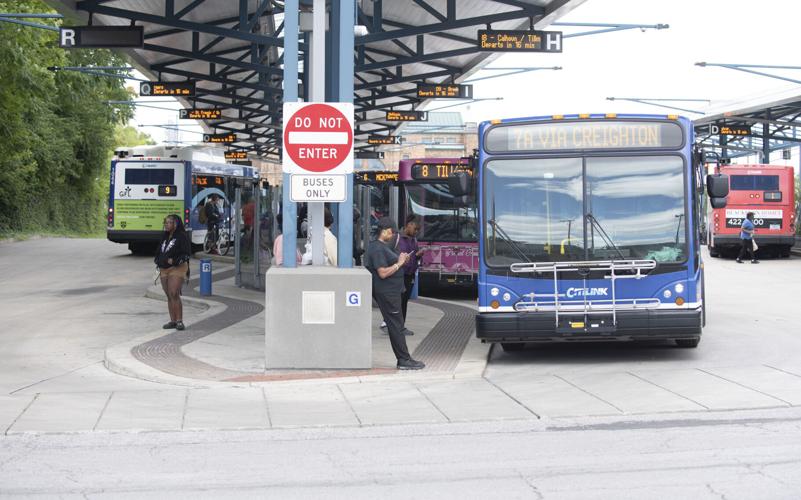Editor’s Note: The below op-ed from Konrad Urberg, chair of the Citilink board of directors, was featured in the Journal Gazette‘s opinion section on March 27, 2025.
Our community’s riders depend on the services provided every day by Citilink. Ridership is recovering here faster than the rest of the nation, and three out of four Allen County residents want to see Citilink services expanded. Yet, we’re facing detrimental service cuts that will be increasingly difficult to recover from.
At a time where our community is prospering as the fastest growing metro region in the tri-state area, I ask you this: Can our community continue at this speed of growth without a thriving public transit system? We have done all within our power at Citilink to absorb costs and advocate for increases. We’re learning we cannot do this alone.
Our community’s riders are depending on you to use your voice for them. Are you up for the challenge? If you would like to contact your elected officials and use your voice, please click here: Who Are My Representatives?
Please see below for Konrad’s op-ed:

People wait to board a Citilink bus at Central Station on Baker Street in August 2024. Fares will rise by a quarter next week, the first increase since 2009. Journal Gazette files
For the first time in 16 years, Citilink is increasing fares. Beginning April 1, regular bus fares will rise from $1.25 to $1.50, with corresponding adjustments to reduced fares and passes.
While this change will help generate additional revenue, it is not a long-term fix for Citilink’s financial challenges.
A significant source of those challenges is a lack of sustainable public transit funding at the state level. Without increased investment, the burden continues to unfairly and disproportionately fall on riders — and even fare increases will not be enough to prevent service cuts if funding shortfalls persist.
Public transit is an essential service. Every day, thousands of riders depend on Citilink to access jobs, medical care, education and grocery stores. However, transit systems require adequate funding to remain viable.
For years, Citilink has absorbed rising operational costs — fuel, maintenance, wages and inflation — without raising fares. At the same time, federal COVID-19 relief funds that temporarily stabilized operations are running out, and state funding has remained largely stagnant.
This leaves Citilink facing a budget deficit that could force service cuts if state leaders do not index state funding to inflation this legislative session.
A fare increase alone will not close the funding gap. Even after this adjustment, Citilink’s fares remain lower than many peer transit systems, and the added revenue will cover only a fraction of rising costs.
The real solution is for our elected officials to increase state transit funding.
Citilink’s biggest challenge is not just rising costs; it’s a funding formula that has failed to keep pace with Indiana’s needs. The Public Mass Transit Fund is the source of state transit funding, yet its distribution formula is outdated and does not consider service area population.
As a result, Fort Wayne — despite being one of Indiana’s largest metro areas — receives only about $2 million in state transit funding, while some smaller cities receive nearly double that amount.
This inequity forces a greater financial burden onto local resources and riders, while failing to account for greater Fort Wayne’s economic and population growth.
Since 2013, for example, Public Mass Transit funding has only increased by 9%, while Citilink’s operating costs have risen by 60%.
Without an increase in state funding, the gap will continue to widen, leading to potential service cuts and reduced mobility for thousands of residents.
Rachel, a Citilink rider with limited vision, moved to Fort Wayne because of the public transit options available. With travel training, she learned how to navigate the system independently. Now, she can commute to work, attend doctor’s appointments and enjoy outings with friends — living a full and independent life despite her challenges.
Public transit empowers people such as Rachel. But without increased funding, essential services could be cut, leaving her and many others without the mobility they depend on, forcing them to rely on costly alternatives or state assistance.
Every $1 invested in public transportation generates $5 in economic returns. With a budget of more than $20 million, Citilink helps generate at least $100 million in economic impact by ensuring people can access jobs, health care, groceries and other necessities.
However, a 14% service cut could drain $12 million in such returns from the local economy as people lose access to employment and essential services.
Without increased funding, these economic benefits are at risk.
Citilink’s recent survey found that 87% of Allen County residents believe public transportation is very important to the community, and 79% say it has a high impact on the local economy. Additionally, 74% of residents would support additional funding for public transportation to expand services.
The strongest public support was for increasing state funding through the Public Mass Transit Fund (79%) and direct contributions from the City of Fort Wayne (78%).
Konrad Urberg is chair of the Citilink board of directors.

